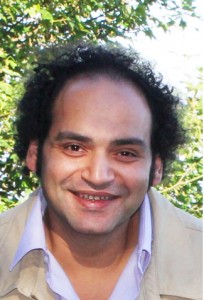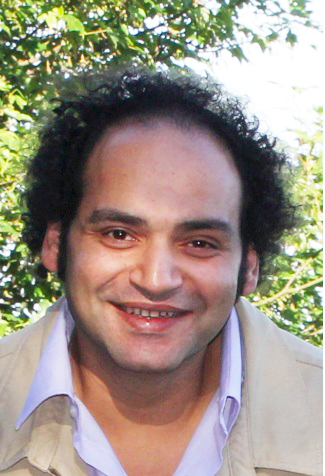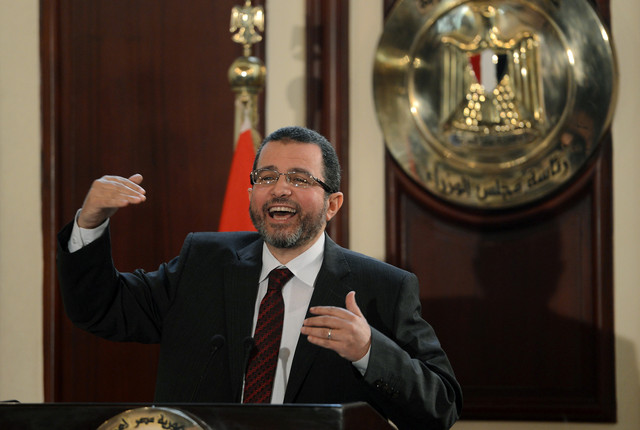 Once again we go back to the very basics, to where it all began. What the police did last night around the presidential palace was nothing but a simple reminder of how things are just the same. Those who fell victim to the illusion of change should now wake up and see things for what they really are.
Once again we go back to the very basics, to where it all began. What the police did last night around the presidential palace was nothing but a simple reminder of how things are just the same. Those who fell victim to the illusion of change should now wake up and see things for what they really are.
The events at the presidential palace last night bring us back to square one, to the fundamental issue the revolution addressed on its very first day: police brutality. What we were reminded of last night was Mubarak’s dearly beloved technique, a relationship between the political leadership and the security apparatus motivated by mutual interest.
Such deviant and lawless relationships between the different branches of the state eventually create a network of power inside a matrix of interests. The interactions inside this matrix constitute the “regime” or the “system”. What the police did last night was but one face of this corrupt system, a blatant sign that this rotten regime must be brought down.
Political efforts to justify what the police did last night are more than ridiculous. According to the Minister of Interior, the police will investigate the case of the man who was dragged, stripped naked and beaten. But the minister added that what happened was a result of pressure and heavy workload. Yes, Egypt is a state where public servants can drag citizens in the street, strip them from their clothes, beat them and probably arrest them afterwards because the public servants are having a bad day!
The Presidency and the majority party saw things similarly as usual. They were both thankful and grateful to the Minister of Interior for his stand against the violence, and were of course sorry for the violent treatment. After a customary promise of a detailed investigation of the violations (which usually leads to nothing) the Brotherhood was satisfied.
In fact, the Minister of Interior, the man who publicly stepped on all the principles of freedom and human dignity this revolution ever called for, was actually thanked by the Presidency. Suddenly, everything the Muslim Brotherhood stood against became legitimate.
The Muslim Brotherhood last night demonstrated one more time that they were never into principles; they know only naked self-interest and pragmatic politics. Being grateful to the Minister of Interior is actually no different than mobilising the militias that beat protesters around the palace last December. Both cases serve the same purpose, violent dispersal of demonstrations and sit-ins that oppose Mohamed Morsy and the Muslim Brotherhood.
However, in December, the Brotherhood took matters into its own hands and mobilised its own men to start a confrontation zone near the palace. Those who were present during those clashes remembered very well how the police were passive and never interfered. Two months later, after passing a constitution and appointing a new minister of interior and a new public prosecutor, the police are now ready and willing to do the Brotherhood’s dirty work.
Of course there will be those who will justify all that happened and blame it on the protesters. “They started it” has become a necessary punch-line in the statements of the Presidency, the government and the Muslim Brotherhood. Trying to justify what happened last night as a mere reaction to violence initiated by the protesters is a lie.
It is true that the protesters started the very first spark —to be more specific, two individuals who tried to climb the palace fence actually started it. Two minutes later, Molotov cocktails were thrown inside the palace garden and things began. But what people tend to ignore while telling that story is that the police gained control in less than 30 minutes and protected the palace. With tear gas and water, protesters were pushed back from the palace fence to at least 500 metres away.
Therefore, the police’s task of protecting the presidential palace as state property ended there. Trying to find excuses for the police on the justification that the protesters started the violence would work to explain the first wave of the attacks, the wave that ended with dispersing protesters away from the palace and sealing a secure parameter around it.
The second wave has absolutely no explanation. It was not in response to any violence because the protesters were 500 metres away and under constant tear gas showers. It was not an attempt to protect the palace either because the parameter set ensured the palace was secure and out of reach, especially since the numbers present were not sufficient to push back 14 trucks of soldiers. Suddenly the police decided to expand the parameter around the palace, to start a tear gas frenzy, then advancing with soldiers and trucks to beat protesters while they were recovering from the gas.
It was an open act of brutal aggression and a vulgar display of power. The only explanation for that second phase, which ended with the “Korba” turning into a stress zone, is seizing the opportunity. Last night was an example of making the best use of a chance to reaffirm the dynamic between the leadership and the police, a dynamic that is politically motivated rather than legally governed.
Yes, there is a violent sentiment that we are all witnessing. However, it is not new; it was always present. The only difference now is that violent sentiments have found the opportunity to organise, to diffuse, and to acquire more believers. This violence will not end when the Salvation Front renounces it or when 6 April decides to withdraw from demonstrations. The violence in the streets and in demonstrations is out of all political forces’ control. It is a direct response to how closed the system is and how much it is resisting radical change while failing in implementing minor reforms.
As long as access to the political system remains restricted by undemocratic procedures and decisions, as long as being represented through elections is a function of economic power and religious manipulation, and as long as the state resists addressing the genuine grievances of the people instead of offering short-termed inefficient solutions—as long as all those maladies endure, violence will erupt and expand. The protesters did not start it, it was started by those who violently resist much-needed change and who are desperately trying to uphold a corrupt regime.




